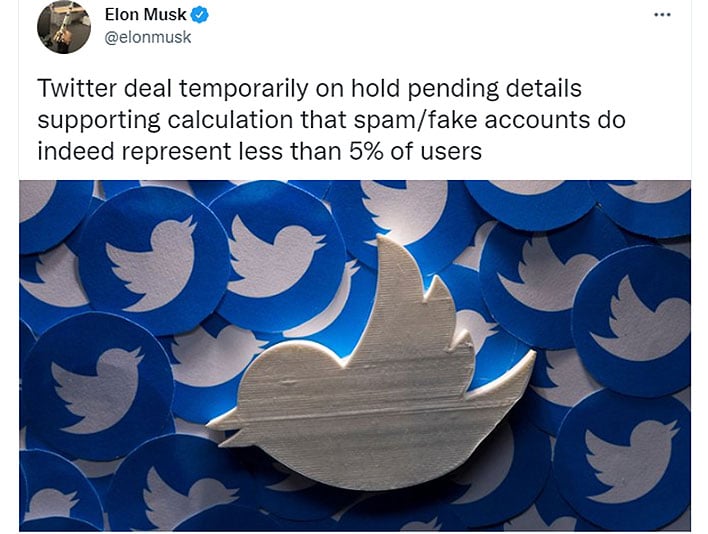Musk Presses Pause On Twitter Deal Because Of Spam Bots
Since Musk made his "best and final offer" to buy Twitter, technology stocks have taken a hard hit amid concerns over inflation and a potential economic slowdown. Shares for the company were down 10% to $40.50 during morning trading on Friday, which is in stark contrast to the $54.20 per share acquisition price.
Spam or fake accounts, often referred to as bot accounts, are typically used in order to manipulate or artificially boost activity on services such as Twitter. The use of these types of accounts can create the illusion that someone or something is more popular than in reality.
Musk has stated that he wants to eliminate bot accounts, stating that he "will defeat the spam bots or die trying." He has also blamed Twitter's reliance on ad revenue for why it has allowed spam bots to prosper.
When speaking with investors Musk said that he was targeting advertising revenue to more than double by 2028, according to a report by the New York Times. By that time, ads are expected to make up around 45% of Twitter's total revenue.
In his recent tweet, Musk attached a news story from ten days ago that cited the fake account figures. Twitter has commented that the figures were only an estimate, and that they could in fact be higher.
According to regulatory filings from Twitter, the estimated number of spam accounts has remained steady below 5% since 2013. This has led some analysts to question why Musk is raising the question now.
"This 5% metric has been out for some time. He clearly would have already seen it... So it may well be more part of the strategy to lower the price," remarked Susannah Streeter, an analyst at Hargreaves Lansdown.
The aforementioned news story points out that there is plenty of precedent for a potential renegotiation of the price following a downturn in the market. There were several companies that repriced agreed acquisitions as the COVID-19 pandemic broke out in 2020.
However, the language in the Twitter deal agreement does not allow Musk to simply walk away because of a deteriorating business environment, such as a drop in demand for advertising, or because the company's stock has taken a nosedive. In fact, Musk is contractually obligated to pay a $1 billion break-up fee if he does not go through with the deal. In turn, Twitter cannot seek more than that from Musk in potential damages.
The fact that Musk chose to tweet his response instead of doing so in a filing, has left some with a feeling of uncertainty. Wedbush analyst Daniel Ives stated in a note that Musk's actions "now sends this whole deal into a circus show with many questions and no concrete answers as to the path of this deal going forward."
Top Image Credit Daniel Oberhaus (2018)



